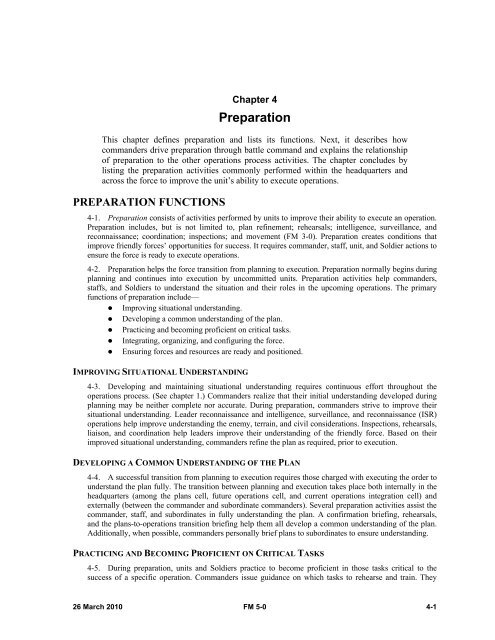FM 5-0, The Operations Process - Federation of American Scientists
FM 5-0, The Operations Process - Federation of American Scientists
FM 5-0, The Operations Process - Federation of American Scientists
You also want an ePaper? Increase the reach of your titles
YUMPU automatically turns print PDFs into web optimized ePapers that Google loves.
Chapter 4<br />
Preparation<br />
This chapter defines preparation and lists its functions. Next, it describes how<br />
commanders drive preparation through battle command and explains the relationship<br />
<strong>of</strong> preparation to the other operations process activities. <strong>The</strong> chapter concludes by<br />
listing the preparation activities commonly performed within the headquarters and<br />
across the force to improve the unit’s ability to execute operations.<br />
PREPARATION FUNCTIONS<br />
4-1. Preparation consists <strong>of</strong> activities performed by units to improve their ability to execute an operation.<br />
Preparation includes, but is not limited to, plan refinement; rehearsals; intelligence, surveillance, and<br />
reconnaissance; coordination; inspections; and movement (<strong>FM</strong> 3-0). Preparation creates conditions that<br />
improve friendly forces’ opportunities for success. It requires commander, staff, unit, and Soldier actions to<br />
ensure the force is ready to execute operations.<br />
4-2. Preparation helps the force transition from planning to execution. Preparation normally begins during<br />
planning and continues into execution by uncommitted units. Preparation activities help commanders,<br />
staffs, and Soldiers to understand the situation and their roles in the upcoming operations. <strong>The</strong> primary<br />
functions <strong>of</strong> preparation include—<br />
• Improving situational understanding.<br />
• Developing a common understanding <strong>of</strong> the plan.<br />
• Practicing and becoming pr<strong>of</strong>icient on critical tasks.<br />
• Integrating, organizing, and configuring the force.<br />
• Ensuring forces and resources are ready and positioned.<br />
IMPROVING SITUATIONAL UNDERSTANDING<br />
4-3. Developing and maintaining situational understanding requires continuous effort throughout the<br />
operations process. (See chapter 1.) Commanders realize that their initial understanding developed during<br />
planning may be neither complete nor accurate. During preparation, commanders strive to improve their<br />
situational understanding. Leader reconnaissance and intelligence, surveillance, and reconnaissance (ISR)<br />
operations help improve understanding the enemy, terrain, and civil considerations. Inspections, rehearsals,<br />
liaison, and coordination help leaders improve their understanding <strong>of</strong> the friendly force. Based on their<br />
improved situational understanding, commanders refine the plan as required, prior to execution.<br />
DEVELOPING A COMMON UNDERSTANDING OF THE PLAN<br />
4-4. A successful transition from planning to execution requires those charged with executing the order to<br />
understand the plan fully. <strong>The</strong> transition between planning and execution takes place both internally in the<br />
headquarters (among the plans cell, future operations cell, and current operations integration cell) and<br />
externally (between the commander and subordinate commanders). Several preparation activities assist the<br />
commander, staff, and subordinates in fully understanding the plan. A confirmation briefing, rehearsals,<br />
and the plans-to-operations transition briefing help them all develop a common understanding <strong>of</strong> the plan.<br />
Additionally, when possible, commanders personally brief plans to subordinates to ensure understanding.<br />
PRACTICING AND BECOMING PROFICIENT ON CRITICAL TASKS<br />
4-5. During preparation, units and Soldiers practice to become pr<strong>of</strong>icient in those tasks critical to the<br />
success <strong>of</strong> a specific operation. Commanders issue guidance on which tasks to rehearse and train. <strong>The</strong>y<br />
26 March 2010 <strong>FM</strong> 5-0 4-1















